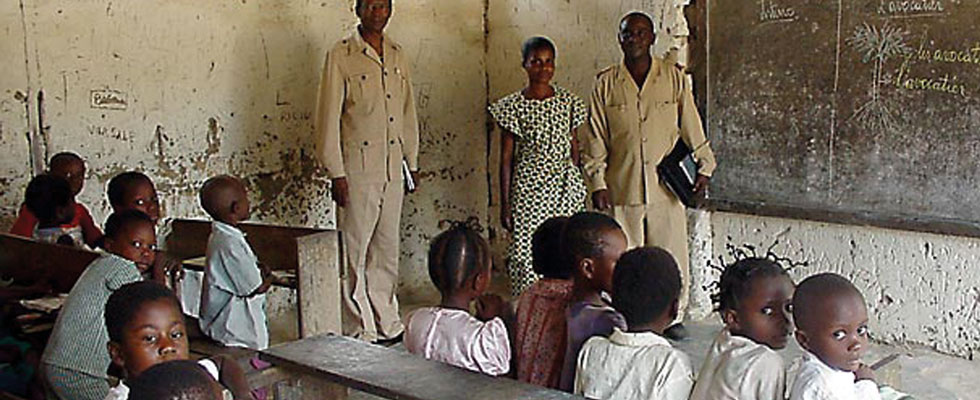
Clad in an oversized blue school uniform and torn brown shoes, holding a disposable plastic bag containing her stationery, the teenage girl trudges through the dusty path leading to the makeshift camp she calls her school.
Report by Michelle Chifamba
A Zimbabwe flag post, a pile of bricks without a roof and a door is the temporary shelter being used as the ablution facility at Sally’s school. The school building, just one long block without window panes or doors and covered with a temporary roof, bears resemblance to a deserted barn. A wooden cabin serves as the administration block. On makeshift benches, the pupils sit as they eagerly wait to receive knowledge from their teachers, some of whom are not experienced. Sally’s experience mirrors that of an entire generation whose chances of receiving top quality education in informal settlements are almost next to nil. This is one of the satellite schools in Hatcliffe Extension, habitant to some of the 2005 Operation Murambatsvina (Clean-Up) victims. Reports indicate that Zimbabwe has approximately 701 satellite primary schools that were not legally registered with the Ministry of Education, Arts, and Sports and Culture, hence no budgetary allocations and no permanent headmasters. According to the Universal Declaration of Rights (1948), education is a public good and a basic human right. The Convention on the Rights of the Child and the Zimbabwean Education Act state that every child shall have the right to education. Yet the prevailing conditions at the satellite schools dotted across the capital reveal a sad state of affairs as the future of the children is being severely compromised and a fundamental right infringed. A pupil at Grace Mugabe Primary School in Hatcliffe Extension appealed to government to improve conditions at satellite schools. “We plead with the government to improve our learning conditions. The schools do not have adequate infrastructure and the teachers in some cases are inexperienced,” she said. At the commemoration of the Global Action Week for Education last year, which aimed its focus on the right to access to basic education for all, Amnesty International spokesperson Semion Mawanza lamented the infringement of the basic right to education. “Education is a fundamental children’s right and if we do not do anything to improve the current situation, we might lose a whole generation, which is not good for the nation and the future of our children,” Mawanza said. According to Amnesty International, there are only three registered formal schools for the 60 000 residents in the area. A number of backyard colleges have gradually mushroomed, offering below standard education to the pupils. Amnesty International notes that although an improvement on the quality of education has been recorded countrywide since 2000, there is still a gap especially in the satellite areas like Hatcliffe Extension and Hopley. Parents and teachers at most satellite schools have accused the government of neglecting the institutions and allowing infrastructure to collapse, posing health hazards to the children. “Makeshift schools have been normalised in these communities, yet lack of proper education with right structures is an infringement on the rights of the child. The unplanned settlements have resulted in compromised access to education. State assistance such as the Basic Education Assistance Module (BEAM) is not accessible to the vulnerable groups in those communities,” said Oswald Madzive, Education Coalition of Zimbabwe board chairperson. After the destruction of the education centres and homes during Operation Murambatsvina in 2005, many children dropped out of school. “There has been a marked rise in backyard colleges which amount to 60 (in Hatcliffe) and most of them do not have adequate learning facilities. Government needs to seriously review Operation Garikai/Hlalani Kuhle especially in terms of service delivery. The roads are inaccessible; there is no sewage disposal, no running water. The place is unfit for offering decent education,” Mawanza said. A teacher at one of the satellite schools said they were yet to benefit from the donor funds, while many children at the school are failing to pay their school fees. “The school has six teachers and 600 pupils. The ratio is too wide. The satellite schools are not formally registered with the Ministry of Education and they do not benefit from the donor funds. We are yet to benefit from the Education Transition Fund,” he said. At another settlement, Hopley, along Chitungwiza Road, more than 2 000 pupils are enrolled at unregistered colleges also characterised by untrained teachers. Deputy Minister of Education, Arts, Sports and Culture Lazarus Dokora said government was committed to rehabilitating satellite schools. It seems the prevailing situation at satellite schools is going against the Millennium Development Goal target 2 which seeks to ensure that children everywhere boys and girls alike, will be able to complete a full course of primary schooling by 2015.











